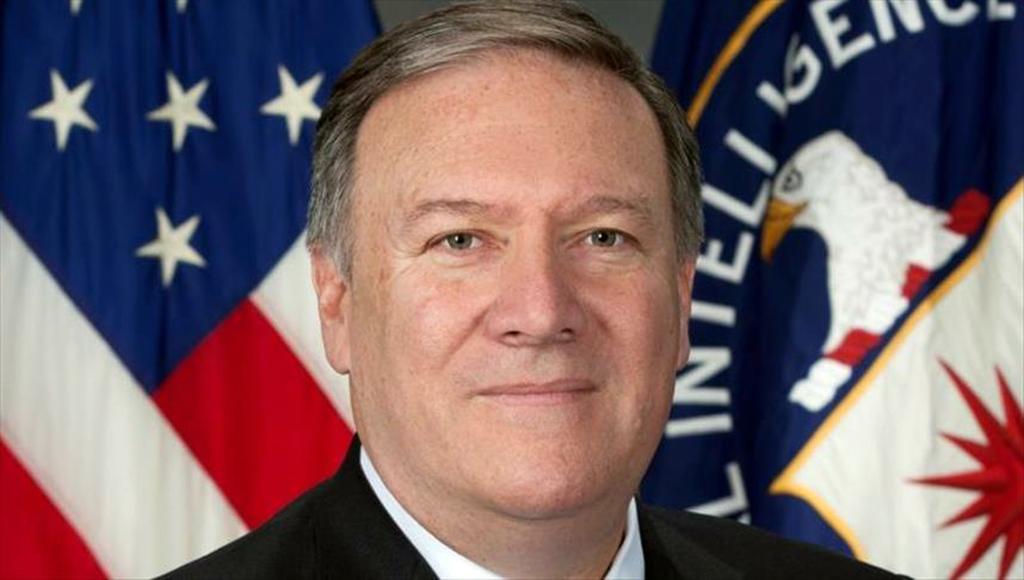
Rule by generals in Washington
With Pompeo taking charge as the new secretary of state, U.S. foreign policy is likely to be more hawkish, which could generate more chaos around the world
Share
In a 2016 book "How Everything Became War and the Military Became Everything: Tales from Pentagon," while mentioning the increased blurring of the border between war and peace, Rosa Brooks also wrote about the U.S.'s increasing use of military instruments in different foreign policy areas and the risks of this emerging habit. She writes: "Americans increasingly treat the military as an all-purpose tool for fixing anything that happens to be broken." She criticized the fact that for the large set of issues, including hurricanes and earthquakes, the U.S. administration has kept using military resources. Referring to the saying, if your only tool is hammer, every problem starts to look like a nail, she argues: "If your only functioning government institution is the military, everything looks like a war – and when everything looks like a war, everything looks like a military mission." In the context of the recent debates regarding the increasing weight of the military in the U.S. administration and its influence on foreign and security matters, it is important to discuss how this militarization can generate influence over foreign policy in the coming months. This ongoing debate has once again been revitalized by the ouster of Secretary of State Rex Tillerson and replacement by CIA Director Mike Pompeo at the State Department.
Trump firing Tillerson did not surprise anybody, but the way it took place shocked many observers of U.S. politics. Tillerson was the first secretary of state in decades fired by the president and process itself was also the first cabinet-level ousting over Twitter. After Trump's tweet, things got worse. A State Department statement revealed that the president had not spoken to Tillerson in advance, that Tillerson did not know the reason for his firing and that he previously did not intend to leave his post. Tillerson's dramatic statement further showed that Trump called him after posting the tweet. There are so many things that can be said about this process and its ramifications in Washington and around the world.
One of the most frequently voiced concern regarding U.S. foreign policy is the increasing role of the military and civilians with military backgrounds and education. Although there are already rumors about the ousting of National Security Advisor H.R. McMaster, there is a dominance of active duty and retired generals in the administration. For the first time in history, both the national security advisor of the president's and chief of staff are generals. Both of these generals work together or at the same time with Secretary of Defense James Mattis, also a general. Even the statements on Tuesday reflected a serious emphasis on the U.S. military. Tillerson praised U.S. servicemen and women and his working relationship with Mattis, and the State Department statement also emphasized the relation between Tillerson and Mattis, which demonstrated the presence of close cooperation and, more importantly, coordination. However, despite this praise for Mattis, it should also be noted that in the last one month Tillerson, was at odds in multiple instances with U.S. Central Command (CENTCOM). First he said that CENTCOM officials misspoke and misportrayed border protection forces. Later in Turkey, he said that the U.S. failed to fulfill its promises to Ankara. And finally last week, the commander of CENTCOM forces, General Joseph Votel, contradicted the Syria strategy that was put forward by Tillerson a few weeks ago. Especially in relation to Turkey, Tillerson's recent statements were considered an attempt to fix derailed relations.
Now after Tillerson's departure, Pompeo, who graduated from the U.S. Military Academy at West Point, will be the new secretary of state. This new appointment raises questions again about the militarization of foreign policy and the decline in the diplomatic capability of the U.S. around the world. If these concerns come true, there will be a vicious cycle in U.S. foreign policy in which the militarization of the language of foreign policy will generate less space for diplomacy, which would increase the scope of military activities, just like Brooks argued, and this will necessitate an increase in the military's budget. In the meantime, the decline of the capability and resources of the State Department will bring further complications to U.S. relations with its partners and allies in different parts of the world. The U.S. is having hard time already in terms of public diplomacy and diplomatic communications. Furthermore, the increasing use of the military in the absence of long-term strategies could generate a situation in which military operations continue to shape U.S. policy, like the situation in Syria. These tactic-based policies may hurt the U.S.'s long-term interest by making its foreign policy less predictable and generating more rifts with allies due to the difficulty in coordinating messages and policies.
In these circumstances it is important for the incoming secretary of state to balance this increasing militarization of U.S. foreign policy. It will be his hardest mission considering the reported lack of morale, motivation and personnel at the State Department.
[Daily Sabah, 16 March 2018]
Tags »
Related Articles
Opinion
Imperialism Orientalism and Zionism: The shaping forces of US Middle East policy
November 2024






